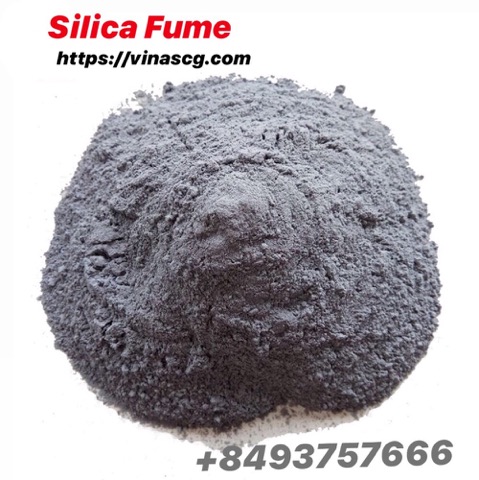What is Silica Fume? Silica Fume, also known as Microsilica, is a fine powder obtained from high-purity quartz reduction in coal in an electric furnace or blast furnace at temperatures above 2000 ° C during the production of silicon or ferrosilicon alloys ( iron silicon). Silica fume is evaporated as an oxidizing vapor from the blast furnace. It cools, settles and is recovered in large sacks. The deposited silica fume is treated to remove impurities and control particle size.

Silica fume applications
1. High strength concrete
With existing silica fume standards and reference projects around the world, enhanced high-strength concrete with silica fume gives architects and engineers a more flexible design. Traditionally in tall buildings using smaller columns is more beneficial (increased space usage), high strength concrete containing silica fume is often used in pre-engineered post-tension beams, allowing for increased internal aperture. design girders. Silica fume concrete has compressive strength up to 100 MPa, modulus of elasticity higher than 40,000 MPa, flexural strength of 14 MPa at the age of 28 days for airport paving and high early age strength for projects Fast construction and use for precast concrete.
2. High performance and durable concrete
High performance concrete (HPC) containing silica fume is a material with great advantages needed for infrastructure renovation. In addition to significantly increased strength and durability, HPC is made with silica fume that is highly waterproof, increases wear resistance and corrosion resistance. Corrosion to the reinforcement in concrete occurs when chloride penetrates into the concrete, damaging the weak protective layer surrounding the reinforcement, causing rust and pitting. Carbonation process is another cause of corrosion of the reinforcement, when the concrete is carbonated to the level adjacent to the steel bar, the neutral (neutral) environment will gradually replace the alkaline environment to protect the reinforcement from being eaten. trail. Under that condition, the reinforcement is no longer passive and quickly corroded. Corrosion caused by carbonation of the concrete cover occurs more slowly than corrosion caused by chloride. The addition of silica fume to the marine construction concrete reduces the permeability of the concrete will be highly effective against the ingress of chlorine ions. The corrosion stimulation of the reinforcement and the destruction of the concrete are clearly controlled, reducing the maintenance costs of the building. Silica fume is suitable for any construction in areas with chloride and groundwater, underground or in the air.
The Changi Water Exploitation Project in Singapore opened in August 2006 is a milestone in the development of the country’s sanitary engineering system. It is designed using silica fume concrete to ensure durability requirements such as water absorption <1% (BS 1881: Part 122), permeability <1000 coulomb (AASHTO T-2777), water penetration. <10mm (DIN 1048), pore permeability <4% (ASTM C642) and absorbency <10% (ASTM C642).
3. Sprayed concrete (Shotcrete)
Silica fume sprayed concrete saves money and time and is more effective than sprayed concrete to stabilize rocks, mine tunnels and repair damaged bridges, and repair offshore columns and piles. Silica fume increases the permissible adhesion with larger thicknesses, which significantly reduces rebound strength and achieves greater flexural strength.
4. Use as repair adhesive mortar
Silica fume is often used as an ingredient in repair adhesive products. A silica fume modified plaster or spray or dry spray mortar can be blended for a variety of applications. It is used for the repair of damaged concrete structures in marine environments where the need to increase the waterproofing and ingress resistance of chlorine ions.
5. Used to seal oil wells
In the oil well wall plaster blasting field, grouting is like a hydraulic sealant in the oil well wall to repair leaks, chisels, and repair damaged areas, the addition of silica fume (Besides creating a enveloping effect in oil wells, spraying mortar also prevents gas permeability), silica fume creates good flow for mortar and is easier to apply. Silica fume mortar significantly reduces water permeability, is able to control gas permeability, while increasing durability and compressive strength.
6. Use as refractory material
Using silica fume in refractory produces better particle stacking and requires less water, with no loss of fluidity. It also increases the ability to synthesize and form mullite at low temperatures in a refractory buffer. Refractory materials containing silica fume have higher strength than non-silica fume, especially under high temperatures and with high density. rather, they maintain a smaller porosity and a greater volume stability.
Silica fume is often used as a binder for repair and refractory manufacturing.
Conclude
Silica fume is a highly efficient polyurethane material, with considerable potential for use in a variety of fields including concrete and mortar. Concrete in all buildings that use silica fume is guaranteed to have high performance and durability, creating many benefits in construction. Ready-mixed dry mortar manufacturers have also begun incorporating silica fume into their mortar composition improving mortar properties for increased durability.
All individuals and organizations wishing to buy Silica fume please contact SCG Vietnam Joint Stock Company through:
Address: No. 03, Lane 342/29 Ho Tung Mau Street, Phu Dien Ward, Bac Tu Liem District, Hanoi City, Vietnam
Mobile / WhatApp / Viber / Weachat / Zalo: Mr. Thanh +84937577666
Email: scg.vietnamjsc@gmail.com
Website: www.vinascg.com




 Tiếng Việt
Tiếng Việt